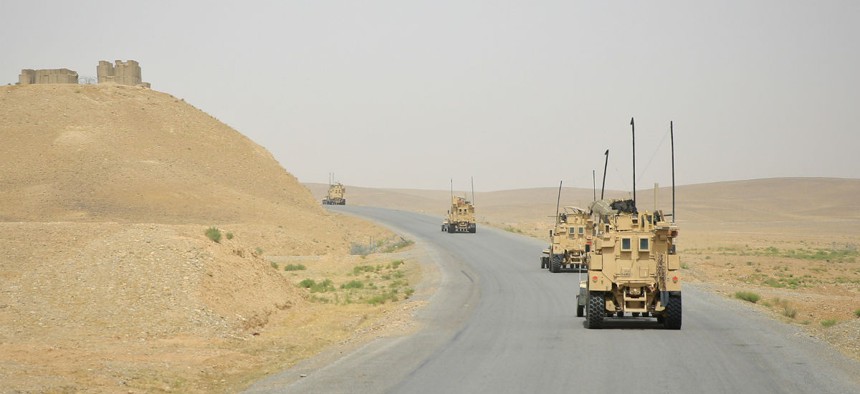
A Marine Corps convoy travels through Afghanistan in May 2014. Lance Cpl. Darien J. Bjorndal/Defense Department
Pentagon Brass: Alternative Energy Isn’t Just for Environmentalists
New documentary aims to counter GOP-planned budget cuts.
Rep. Randy Forbes, R-Va., made waves back in 2012 when he admonished Navy Secretary Ray Mabus and reminded him he was “not the secretary of Energy.” That exchange made it into the documentary film “The Burden,” a plea for the military to kick its expensive fossil fuel habit. Since its March premiere, the film has been viewed on several Pentagon desktops.
At a Tuesday night screening in a borrowed theater in Arlington, Va., several top Defense Department officials joined producer and director Roger Sorkin in a panel discussion about the viability of alternative fuels.
The documentary’s title is brought home through testimony by Army and Marine Corps veterans of the wars in Iraq and Afghanistan, who assert that combat missions are hindered by the military’s dependence on petroleum. Fuel accounted for half of all convoy loads in Iraq, one said. That created an additional burden on troops to escort and protect those loads from enemy attacks and resulted in a “30 percent loss of fuel efficiency,” according to the documentary.
The portion of the Defense Department’s operational energy budget spent on non-petroleum sources such as algae-based fuel and solar power—5.2 percent—is a “hot button on the Hill,” Sorkin told Government Executive at a reception co-sponsored by the Truman National Security Project and tech firms Alytic Inc. and Eastern Foundry. Indeed, the limits lawmakers placed on the services’ pursuit of green energy in the fiscal 2016 National Defense Authorization Act were cited in President Obama’s statement threatening a veto.
Sorkin characterized the film’s screening to an audience of energy contractors, veterans and environmentalists “as a converging place to make deals, real nuts and bolts,” as opposed to a melodramatic exhortation about climate change. “Al Gore inspired a lot of people to buy Priuses, but he made others change the channel,” the filmmaker said. “The issue has become highly politicized, but there is demand for clean energy solutions.”
Adm. Kevin Slates, director of energy and environmental readiness on the Chief of Naval Operations' staff, told Government Executive the challenge “is about capability and saving lives, so we're perusing technology that reduces our consumption that could save a few days at sea without having to refuel and we're also testing alternative energy sources that will provide more options down the road, which builds our readiness.” Slates, who appeared on a post-screening panel with colleagues from the Army and the Defense secretary’s acquisition office, said his goal is to “emphasize the importance of energy as a combat enabler to educate congressional representatives debating the Navy’s budget for energy initiatives or alternative fuel testing.”
The subject of climate change is raised in the film, in interviews with influential military leaders, including retired Gen. Anthony Zinni, former commander in chief of U.S. Central Command and former Marine Corps Commandant James Amos, who warns, “We need to tighten our load, and we need alternative energy sources.” Sharon Burke, assistant secretary of Defense for operational energy plans and programs, says, “It is incumbent on us to use energy differently because there are opportunity costs” when troops are reassigned to escort convoys of fuel trucks.
The film touts alternative energy as a business opportunity for veterans, featuring passionate comments from Indianapolis Republican Mayor Greg Ballard, an ex-Marine who served in the first Gulf war. He bemoans the decline in the number of veterans serving in Congress who know the horrors of war.
The film calls for a major strategic shift away from an economy in which the United States consumes 20 percent of the world’s oil. As one Marine put it, “I’m sick of spending $85 billion to protect oil choke points around the world.”







